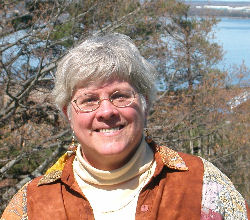 Dr. E. Dianne Looker, Professor Emerita in the Department of Sociology and Anthropology at MSVU, has been appointed to the governing council of the Social Sciences and Humanities Research Council for a three-year term.
Dr. E. Dianne Looker, Professor Emerita in the Department of Sociology and Anthropology at MSVU, has been appointed to the governing council of the Social Sciences and Humanities Research Council for a three-year term.
Dr. Looker was a Tier 1 Canada Research Chair in equity and technology at MSVU, examining issues of how gender, ethnicity, rural-urban, and socio-economic status impact the facility with, and access to, technology. Prior to joining MSVU, Dr. Looker was a full professor at Acadia University in the Department of Sociology, where she also served as Chair of the Department from 1995 to 2002. She is a Professor Emerita at Acadia as well.
SSHRC’s governing council offers a broad view of Canada’s needs and opportunities, and advises the president of SSHRC on strategy, risk management, performance management and stakeholder relations. Council members are leading representatives from the not-for-profit, public, private and academic sectors. They represent the diversity of the Canadian public across all regions of the country, and bring their knowledge of societal and research issues, including the application of research results, to ensure public funds are allocated in a way that maximizes outcomes and impacts.
Members of SSHRC’s governing council are appointed by the Governor in Council, on the recommendation of the minister of Innovation, Science and Industry, following a formal selection process led by Innovation, Science and Economic Development Canada and the Privy Council Office. SSHRC does not play any direct role in this selection process.
About Dr. Looker
Dr. Looker has been passionate about research for her entire career, ever since being an undergraduate student at Carleton University from where she graduated in 1967 with a Bachelor’s degree in Sociology. She went on to pursue her research at the University of Waterloo (MA, 1971) and McMaster University (PhD, 1977).
She has served on many committees both internal to and external to the university. She was co-chair of the Atlantic Research Data Centre, which gives researchers access to restricted Statistics Canada data. In this capacity, she actively participated in the Canadian Research Data Centre Network Coordinating Committee. She has advised various national organizations, including Industry Canada; Statistics Canada; Employment and Social Development Canada; the Canada Millennium Scholarship Foundation, and the Council of Ministers of Education, Canada. She currently undertakes contract work, such as analyses for the Annual Reports for the Canadian Association for Graduate Studies.
Her research has focused on youth, particularly rural youth and their transitions to adulthood. An important part of that focus involved research on youth’s educational pathways. She presented a (virtual) keynote address at the National Rural Education Conference in Saskatoon (March 2021) on current issues in rural education in Canada. She has received numerous grants and contracts to pursue her research and has extensive publications in both books and peer reviewed journals.
Dr. Looker is a champion of small universities, and of institutions in rural settings. She is also aware of the important role that older but still active academics can play, as researchers in their own right, and as supports and mentors for younger scholars. In these ways, the expertise of older researchers can be harnessed to enhance the quality of social science and humanities research in Canada.
Congratulations on your appointment, Dr. Looker!
![]() We’re advancing research, scholarly work and professional activity. Learn more about this MSVU Strategic Plan Theme »
We’re advancing research, scholarly work and professional activity. Learn more about this MSVU Strategic Plan Theme »